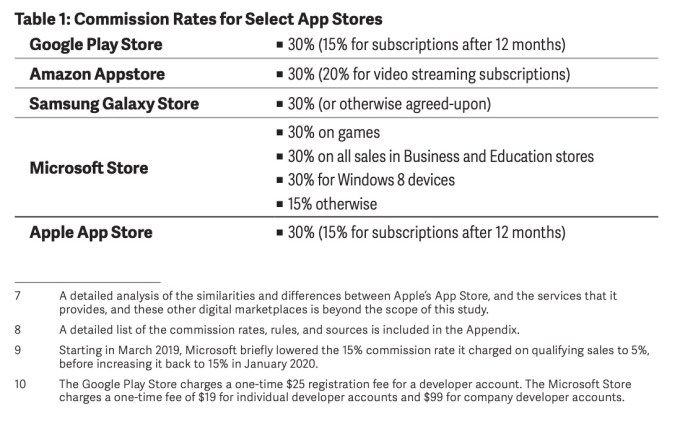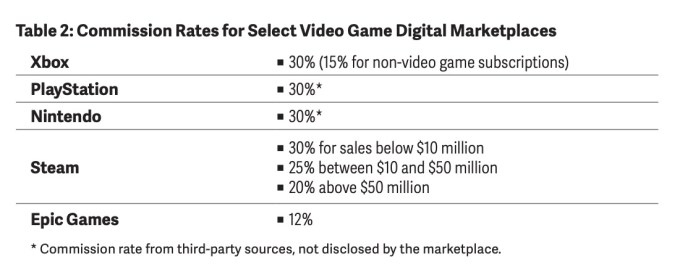Apple digs in heels over its App Store commission structure with release of new study
Apple today is again taking to the press to fight back against claims of anti-competitive practices on its App Store. Last month, the company detailed the results of a commissioned study that showed how Apple wasn't receiving a cut of revenue on the majority of App Store transactions - $519 billion in commerce. This time, Apple is touting the results of a new study that is meant to demonstrate how Apple's App Store commission rate is similar to those of other app stores and digital content marketplaces.
The new study also comes from the Analysis Group, the same analyst group Apple used for its most recent study. The fact that Apple has tasked the firm with rolling out a series of reports to argue its case via market data indicates how seriously Apple is taking the antitrust claims.
Today, Apple is facing antitrust investigations in both the U.S and the E.U. Regulators are not only looking at Apple, but also at other top tech companies - including Google, Amazon and Facebook - to determine whether they've used their size and power to limit competition. Apple CEO Tim Cook, in fact, is set to testify before the House Judiciary Antitrust Subcommittee on Monday, July 27, making the study's release even more timely, not to mention an obvious attempt at shifting the narrative in Apple's favor.
The case against the App Store is a complicated one.
The argument for anti-competitive behavior stems from a number of factors: that Apple requires developers to process payments through its payments system, giving it a cut of transactions, as opposed to permitting the use of third-party payment processors; that Apple competes with third-party developers on the same platform while profiting from its rivals' businesses; that Apple doesn't allow developers any other means of distribution on its iOS platform besides listing on the App Store, which limits all sorts of apps from publishing; that Apple gives its own first-party apps deeper and more granular access to its operating system's controls and features; and finally, that the cost of doing business on the App Store - typically, a 70/30 split between Apple and developers - is simply too high for the services provided, and it's not universally enforced.
This latter point is the one Apple wants to dive into today.
The new study details the commission rate of Apple's App Store and compares that with other two-sided marketplaces. On the iOS App Store, Apple's commission rate is 30% for paid apps, in-app purchases of digital content and services, and the first year for in-app subscriptions. It falls to 15% after the first year for subscriptions.
This study points out that most app stores and video game marketplaces have the same commission structure as Apple's (30%). This includes the Google Play Store, Amazon Appstore, Samsung Galaxy Store, Microsoft Store, plus game marketplaces across Xbox, PlayStation, Nintendo and Steam platforms (Steam is 30% for sales below $10 million). Some stores drop the 30% commission rate in specific cases - for example, Steam drops it for higher sales; Amazon charges 20% commissions on video streaming subscriptions; Xbox charges 15% for nongame subscriptions, and so on.

Image Credits: Analysis Group
Epic Games, the makers of Fortnite and one of the larger companies arguing against the current App Store model, charges 12%, however. That company has also notably stated its belief that a lower commission can help to fuel developer innovation and increases competition.

Image Credits: Analysis Group
The new study additionally details the commission rates for a wide range of non-app store/game store platforms, including digital content platforms, e-commerce marketplaces and even brick-and-mortar retailers.
Among digital content platforms, the study looks at businesses like Roku, YouTube, Amazon Prime Video Direct, Spotify's Anchor, Nook, Audible, Patreon and others - many of which are 30% or higher. It points out that e-commerce marketplaces will sometimes exceed the 30% commission rate. This part of the study tracked commissions at 17 large digital marketplaces, including Amazon, eBay, Etsy, Walmart, Poshmark, Airbnb, Uber, Lyft, Stubhub, Ticketmaster, TaskRabbit and others.
The study even notes that developers can make more money through digital distribution than through brick-and-mortar, which is an odd point of comparison, really.
The report is handy in terms of having all this commission data centralized for easy reference in one place, as often companies hide their commission structure deep in their Help documentation, if they openly publish it at all. But it's also, broadly speaking, common knowledge - and entirely missing the point. The antitrust issues surrounding Apple's App Store are not about whether Apple is charging more than other digital marketplaces. It's about whether that commission structure is hindering competition, given Apple's size, wealth and power.
Apple could have gotten ahead of this whole problem by simply lowering its commission rate and expanding its existing carve-out for what it calls reader apps" - those that allow users to access previously purchased content or subscriptions. Today, reader apps include magazines, newspapers, books, audio, music, video, access to professional databases, VoIP, cloud storage and other approved services like classroom management apps. This is, for example, how streaming services like Netflix are allowed to distribute an app that doesn't offer sign-up, only a login.
But instead, Apple is doubling down. That the company is battling over its 30% commission, arguing openly that the commission is both commonplace and fair, is an indication of the growing importance of Apple's Services businesses to its bottom line.
That business is led by its Digital Content and Services segment, which includes the App Store. In Q2 2020, Apple's Services revenue hit an all-time high of $13.35 billion, up from $11.45 billion in the same quarter last year. With every quarter, Services grows more critical to Apple's overall growth as a company, particularly as the smartphone market itself becomes more saturated and newer economic pressures, like the pandemic, dampen iPhone sales.